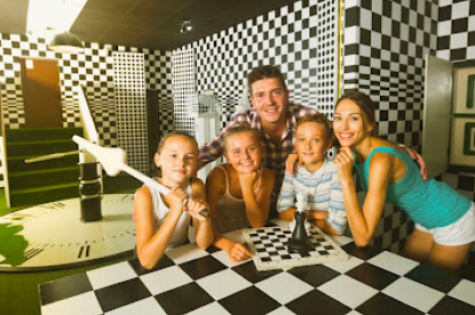It can be challenging to find things for kids to do in the school holidays. Additionally, COVID-19 has added a complication of periods of isolation, which can be very uncertain and frightening for children.
Since more time will be spent at home, it will be easier to depend on screens for kids' entertainment and schoolwork. Kids, however, need real-life opportunities to learn and play as well. Through traditional play, children learn to interact, think creatively, solve problems, and much more.
Here are six ways that you can help keep the kids entertained during school holidays without having to rely on screens - both inside and outside of your home.
Try Something Different With An Escape Room
Many parents are turning to the escape room for kids experience as a unique and fun way for families to get together and solve puzzles in a realistic environment
In addition to entertaining youngsters, escape room games also provide them with the opportunity to interact. There are numerous advantages to these types of games for kids.
Teamwork is the goal of an escape room game. All the puzzles in the game can be solved by working together, and players can find clues to help them find a way out. Working together is paramount to ensure this goes as smoothly as possible.
Escape room experiences provide children with a great opportunity to exercise their cognitive abilities and to learn how to think outside the box. Due to the nature of the entire process, escape room games also offer a great family bonding experience. Plus, they also provide plenty of physical exercise your family members won't get sitting in front of their screens.
Learn To Cook Together
Modern kitchen appliances simplify the process of cooking, so your child feels as if they helped make a meal and is proud of helping you. The smile on a child's face when they know they contributed to something delicious is rewarding.
Mastering cooking is an important life skill. But did you know that cooking can also contribute to a child's mental, physical, and social development? Research has shown that children learn best by experiencing things, and cooking helps the little ones gain basic kitchen skills, improve their maths skills through measurements, and learn about hygiene and other kitchen responsibilities.
Work Together on Arts And Crafts Projects
Imagination, communication, and listening can be developed through craft activities. They can also enhance mental health and wellbeing as well as foster a whole range of developmental skills in preschoolers, including improving fine motor skills, improving hand-eye coordination, increasing manual dexterity, and identifying shapes, colours, and textures.
Colours, shapes, and textures are learned through working with materials. Seeing how things work and how they fit together helps children tap into their creative side and encourages them to play and experiment in a relaxed and fun environment.
Create a Home Obstacle Course
Create your own obstacle course at home and reveal your inner Australian Ninja. Take it easy on the toddlers and adjust the course according to their age and athletic level. Keep the instructions as simple as possible to ensure a smooth game experience.
You can use a range of materials already in your home including trampolines, pool noodles, sporting equipment, lumber, bean bags, skipping rope and hula hoops.
Discover Local Waterholes and Hiking Trails
If you are not in lockdown, there is almost no better family experience than packing up the car and heading to a local national park, beach or other natural attraction.
Hiking is an excellent way to instil a lifelong love of nature in children. Plan your trips to ensure the trails are not too arduous for the young ones and try to find options that include waterholes, waterfalls, beaches or lagoons so that everyone can cool off.
Remember to pack all of the essentials like sturdy walking shoes and wide-brimmed hats for everyone, sunscreen, plenty of water and a first aid kit just in case.
Garden Together
Growing things helps children learn. Spending time in the garden tending to plants and growing their own food can help children learn new skills, have fun, play, and develop their self-confidence.
Almost all children enjoy being outdoors and digging in the soil, getting dirty, creating things, and watching plants grow.
The benefits of gardening are enormous for people of all ages, but children, in particular, will have lots of fun. Among the skills learned through gardening include responsibility, confidence, reasoning, discovery, cooperation, and nutrition awareness.
There are many other activities you can consider as well, like board games, learning music together or building and creating things together. The important thing is that you try to minimise screen time in the holidays and during periods of isolation and do things together as a family - you will all reap the rewards.















__small.png)










